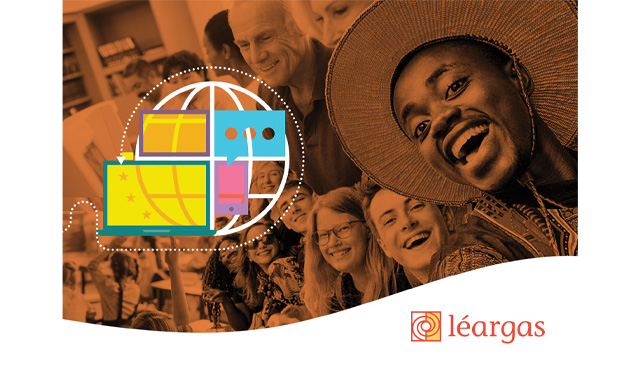Léargas and Digitalisation: Committed to Connecting During COVID

As Ireland’s National Agency for European Union programmes like Erasmus+ and eTwinning, Léargas has managed international and national exchange programmes in the adult education, school education, vocational education and training, and youth sectors for more than 30 years. These exchanges connect people across different communities, counties, and countries, and bring a European dimension to Irish organisations.
It might be natural to assume that Covid-19 would bring this work to a standstill. While restrictions have indeed made international travel a distant memory, Irish participants in European programmes continued to interact with other communities and countries, pursue their project objectives and benefit from engagement with European counterparts, and they did it all online.
In Léargas, we quickly digitalised complex international events like Transnational Cooperation Activities, which were intended to bring professionals from across Europe to meet face-to-face and work together. Ultimately, moving this collaborative space online proved hugely important in the midst of the pandemic.
“It’s [about] staying connected,” says Lisa Downes, a TCA attendee and Youth Worker at St Andrews Resource Centre in Dublin. “We were feeling quite isolated on a European level, local level, every level. It’s about keeping the conversation [going] and keeping the doors open.”
For some, being involved in European programmes before lockdown had already laid the groundwork for a new, online way of working. “If we hadn’t been involved in European projects, we wouldn’t have that digital infrastructure and learning in place, so wouldn’t have been able to connect online,” says Sarah Boland, Assistive Technology Facilitator at Saint John of God Community Services. Sarah found that moving SJOG services online was made easier because of the organisation’s previous involvement in Erasmus+ Adult Education Strategic Partnerships, which enhanced digital skills and improved accessibility.
Similarly, eTwinning, the online community for schools across Europe, “literally came into its own during lockdown”, according to Glenda McKeown, a teacher at Our Lady of Fatima Special School in Wexford. eTwinning links more than 500,000 primary and post-primary teachers across the continent to work on collaborative projects using information and communication technology. Glenda’s project was about supporting pupils’ mental health and she found that using the platform “kept us on the right road, the learning continued”.
Transferals like these were a constant reminder of the importance of digital education. Without the right skills and methods, navigating the digital realm can become draining.
Last September, in direct response to these challenges, the European Commission funded two new types of Erasmus+ Strategic Partnership projects. Almost €2.5 million was available to organisations in Ireland to support the recovery process, and to build digital and creative readiness in some of the hardest-hit sectors.
This commitment to support digital transformation among learners, educators, youth workers, young people and organisations remains, and is one of the four key priorities of the new Erasmus+ programme for 2021–2027.
If 2020 has taught us anything, it’s that the adaptive nature of Erasmus+ and those who take part in it will continue to create connection and innovation in education, training and youth work. Many of us felt our horizons growing narrower under lockdown, and discovered that even virtual travel broadens them.
Programme Support & Development Team: psdt@leargas.ie / eTwinning: etwinning@leargas.ie
W: www.leargas.ie
Twitter: www.twitter.com/Leargas
Facebook: www.facebook.com/Leargas.ireland
LinkedIn: www.linkedin.com/company/leargas/






